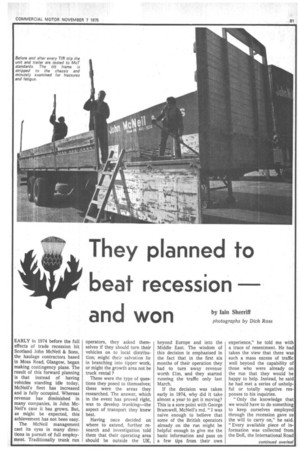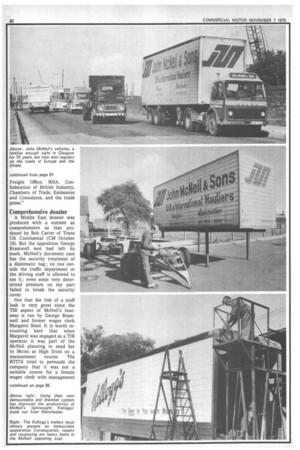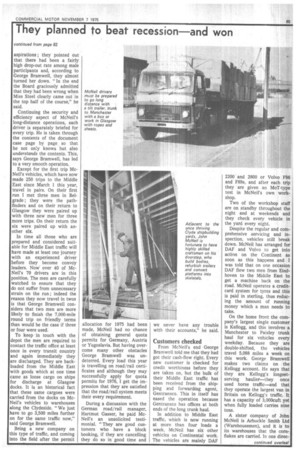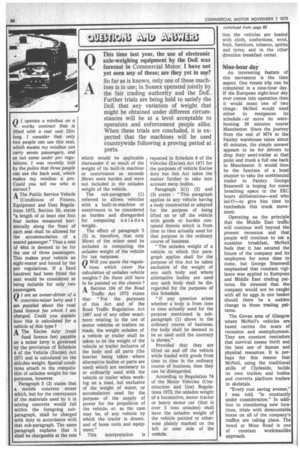They planned to beat recession and won
Page 83

Page 84

Page 87

Page 88

If you've noticed an error in this article please click here to report it so we can fix it.
by bin Sherriff
photographs by Dick Ross EARLY in 1974 before the full effects of trade recession hit Scotland John McNeil & Sons, the haulage contractors based in Moss Road, Glasgow, began making contingency plans. The result of this forward planning is that instead of having vehicles standing idle today, McNeil's fleet has increased and is fully occupied. Whereas revenue has diminished in many companies, in John McNeil's case it has grown. But, as might be expected, this achievement has not been easy.
The McNeil management cast its eyes in many directions in pursuit of full employment. Traditionally trunk run operators, they asked themselves if they should turn their vehicles on to local distribution; might their salvation lie in branching into tipper work, or might the growth area not be truck rental ?
These were the type of questions they posed to themselves; these were the areas they researched. The answer, which in the event has proved right, was to develop trunking—the aspect of transport they knew best.
Having once decided on where to extend, further research and investigation told them that their operating area should be outside the UK, beyond Europe and into the Middle East. The wisdom of this decision is emphasised in the fact that in the first six months of their operation they had to turn .away revenue worth Elm, and they started running the traffic only last March.
If the decision was taken early in 1974, why did it take almost a year to get it moving? This is a sore point with George Bramwell, McNeil's md. "I was naive enough to believe that some of the British operators already on the run •might be helpful enough to give me the basic information and pass on a few tips from their own experience," he told me with a trace of resentment. He had taken the view that there was such a mass excess of traffic well beyond the capability of those who were already on the run that they would be happy to help. Instead, he said he had met a series of unhelpful or totally negative responses to his inquiries.
"Only the knowledge that we would have to do something to keep ourselves employed through the recession gave us the will to carry on," he said. "Every available piece of information was collected from the DoE, the International Road Freight Office, RHA, Confederation of British Industry, Chambers of Trade, Embassies and Consulates, and the trade press."
Comprehensive dossier
A Middle East dossier was produced with a content as comprehensive as that produced by Bob Carter of Trans UK Continental (CM October 10). But the opposition George Bramwell met had left its mark. McNeil's document case has the security treatment of a diplomatic bag ; no one outside the traffic department or the driving staff is allowed to see it ; even some very determined pressure on my part failed to break the security cover.
Not that the risk of a staff leak is very great since the TIR aspect of McNeil's business is run by George Bramwell and former wages clerk Margaret Steel. It is worth recounting here that when Margaret was engaged as a TIR operator it was part of the McNeil planning to send her to Motec at High Ercol on a management course. The RTITB tried to persuade the company that it was not a suitable course for a female wages clerk with management aspirations ; they pointed out that there had been a fairly high drop-out rate among male participants and, according to George Bramwell, they almost turned her down. "In the end the Board graciously admitted that they had been wrong when Miss Steel clearly came out in the top half of the course," he said.
Continuing the security and efficiency aspect of McNeil's long-distance operations, each driver is separately briefed for every trip. He is taken through the contents of the document case page by page so that he not only knows but also understands the contents. This, says George Bramwell, has led to a very smooth operation.
Except for the first trip McNeil's vehicles, which have now made 250 trips to the Middle East since March 1 this year, travel in pairs. On their first run I met three men in Belgrade; they were the path finders, and on their return to Glasgow they were paired up with three new men for three more trips. On their return the six were paired up with another six.
In time all those who are prepared and considered suitable for Middle East traffic will have made at least one journey with an experienced driver before they become convoy leaders. Now over 40 of McNeil's 70 drivers are in this position. The men are carefully watched to ensure that they do not suffer from unnecessary strain on the run ; indeed the reason they now travel in twos is that George Bramwell considers that two men are more likely to finish the 7,000-mile round trip on friendly terms than would be the case if three or four were used.
To keep in touch with the depot the men are required to contact the traffic office at least once in every transit country and again immediately they are discharged. They are backloaded from the Middle East with goods which at one time came as loose cargo on ships for discharge at Glasgow docks. It is an historical fact that these same cargoes were carried from the docks on McNeil's vehicles to warehouses along the Clydeside. "We just have to go 3,500 miles further on for the same traffic now," said George Bramwell.
Being a new company on this type of traffic, and coming into the field after the permit allocation for 1975 had been made, McNeil had no chance of obtaining general quota permits for Germany, Austria or Yugoslavia. But having overcome many other obstacles George Bramwell was undeterred. Every load this year is travelling on road/rail certificates and although they may successfully apply for quota permits for 1976, I get the impression that they are satisfied that the road/rail system meets their every requirement.
During a discussion with the German road/rail manager, Hartmut Gasser, he paid McNeil's an unsolicited testimonial. "They are good customers who have a block booking, if they are cancelling they do so in good time and we never have any trouble with their accounts," he said.
Customers checked
From McNeil's end George Bramwell told me that they had got their cash-flow right. Every new customer is checked for credit worthiness before they are taken on, hut the bulk of their Middle East traffic has been received from the shipping and forwarding agent, Gentransco. This in itself has eased the operation because Gentransco has offices at both ends of the long trunk haul.
In addition to Middle East traffic, which is now running at more than four loads a week, McNeil has six other vehicles on Continental work. The vehicles are mainly DAF 2200 and 2800 or Volvo F86 and F89s, and after each trip they are given an MoT-type test in McNeil's own workshop.
Two of the workshop staff are on standby throughout the night and at weekends and they check every vehicle in the yard every night.
Despite the regular and comprehensive servicing and inspection, vehicles still break down. McNeil has arranged for DAF and Volvo to get into action on the Continent as soon as this happens and I was told that on one occasion DAF flew two men from Eindhoven to the Middle East to get a machine back on the road. McNeil operates a creditcard system for tyres and this is paid in sterling, thus reducing the amount of running money which a man needs to take.
On the home front the company's largest single customer is Kellogg, and this involves a Manchester to Paisley trunk haul for six vehicles every weekday. Because they are double-shifted, the vehicles travel 5,088 miles a week on this work. George Bramwell makes two claims on the Kellogg account. He says that they are Kellogg's longestserving haulier—they once used horse traffic—and that they operate the largest van in Britain on Kellogg's traffic. It has a capacity of 3,000cuft yet when fully loaded carries nine tons.
A sister company of John McNeil is Arbuckle Smith Ltd (Warehousemen), and it is to its warehouses that the cornflakes are carried. In one direc tion the vehicles are loaded with cloth, confections, wool, fruit, furniture, tobacco, spirits and tyres; and in the other direction breakfast cereal.
Nine-hour ,day An interesting feature of this movement is the time aspect. One return trip can be completed in a nine-hour day. If the European eight-hour day ever comes into operation then it would mean one of two things : McNeil would need either to reorganise its schedule ...or move its warehousing 30 minutes nearer Manchester. Since the journey from the end of M74 to the Paisley warehouse takes about 45 minutes, the simple answer appears to be for drivers to drop their semi-trailer at that point and trunk a full one back to Manchester. It would then be the function of a local shunter to take the northbound trailer to Paisley. George Bramwell is hoping for some breathing space in the EEC hours deliberations—and who isn't?—to give him time to reschedule this trunk movement.
Operating on the principle that the Middle East traffic will continue well beyond the present recession and that people will continue to eat a sunshine breakfast, McNeil feels that it has secured the future of the company and its employees for some time to come, but George Bramwell emphasised that constant vigilance was applied to European and Middle East trading patterns. He stressed that the company would not be caught with all its eggs in one b.asket should there be a sudden change in these trading patterns.
The Govan area of Glasgow where McNeil's vehicles are based carries the scars of recession and unemployment. They are constant reminders that survival means thrift and the best use of human and physical resources. It is perhaps for this reason that McNeil, using the traditional skills of Clydeside, builds its own trailers and bodies and converts platform trailers to skeletals.
"Every cost saving avenue," I was told, "is constantly under consideration." In addition to considering new locations, trials with demountable boxes on all of the company's traffics are taking place. The mood at Moss Road is one of constant workmanlike approach.
















































































































































































































